1000s of years of Paper and No Real Digital Alternative: An Engineers Take on Organization

I'm a software engineer by trade and ironically I can't use computers (mostly) to organize my work or life. I've struggled my entire life to stay organized and on top of tasks that need to be done. It wasn't until a few years ago that I was diagnosed with ADHD (the inattentive kind which is why it wasn't found as a kid) that things fit a bit more. It's not that I was lazy or anything like that, but I was working with poor memory and systems not adapted to my needs. Maybe like me you've struggled with thinking you're not doing enough (without a realistic idea of what "enough" is) or you've tried every organizing tool or methodology under the sun that doesn't seem to cut it, or you can relate to Scorched Earth Syndrome, then this post is for you. It's definitely for the me 20 years ago who really could have used it.
I'm not going to sell you on a specific method. What I will describe and the process how I got there is specific to me. What I am trying to get at is adapting and creating systems for your needs and being flexible to change them. Neurotypical or not, I think being able to build systems up for your needs is far more valuable than trying to fully copy someone else's. We're individuals with different needs and constraints and traits that can be used to our advantage.
Here's a top level overview of what I do so that you can see the journey to get here:
- Any tasks I think of throughout the week for the next week go into Google Keep
- On Sundays I plan out the week using weekly and monthly themes as guide posts
- Tasks for each day are categorized as No Big Deal, Quarter Day, Half Day or a Full Day's worth of effort so that I know how much work something will take
- Tasks are then assigned to each day with up to a Full Day's worth of tasks when added up
- Monday is then locked in and I write that down in my daily planner and my partner takes a pic of it to know my schedule for the day
- This lock in happens each night with adjustments made to the weekly plan as needed
- When I lock it in I commit to that set of work for the day and try to finish in my working hours
- Repeat this pattern each week
I've tried ADHD meds, every digital app you can think of, and every methodology there is, but this is what has worked for me best. Maybe this will work for you too, but I want to bring you along my journey to see how I got to this system and why it has worked for me which will hopefully inspire you dear reader to make a system that works for you!
Knowing oneself is the first step
This summer after leaving my last job and not having the most organized job search schedule led to my partner Stephanie giving me a big push to get organized. She'd seen how my lack of organizing had been affecting my professional growth and our day to day lives and it wasn't great to put it mildly. She pushed me to start a system any system to get started and I agreed as I was finally at the point where I couldn't let this continue. I had to come up with something that would work for me and so to do that I had to understand my constraints and myself:
- Having something digital wouldn't work as the place to house my tasks as it's too distracting
- If I am held accountable for something or there's a deadline I tend to finish a task
- I have poor working memory
- I tend to think I'm not doing enough, but only really account for "butt in chair" hours rather than effective time usage
- I'm on time for events (thankfully) unless I hyper focused on something but that's rare
- I tend to overestimate how quickly I can finish a task
- I tend to underestimate how much a task will stress me out
It's important to note that I had to genuinely want to change. I'm used to being able handle sub par situations and so I knew for years "I should get organized", but I don't think I truly wanted it the way I do now until I had a partner advocating for the change and also just seeing how it affected my professional career negatively. The other important part was I just had to accept certain things about myself. I have a poor working memory is something I could say now, but before I'd say "I should be able to remember what I need" or "I won't forget it". Nope I will and I should build systems around that fact. Much like how in programming we automate checks and tests to make sure things will continue to work the same thing goes for the systems I had to design. The system needed to account for how I work and be automated or at the very least accepted as part of the design.
The first iteration of my system was a bunch of post its on the walls like a kanban board.
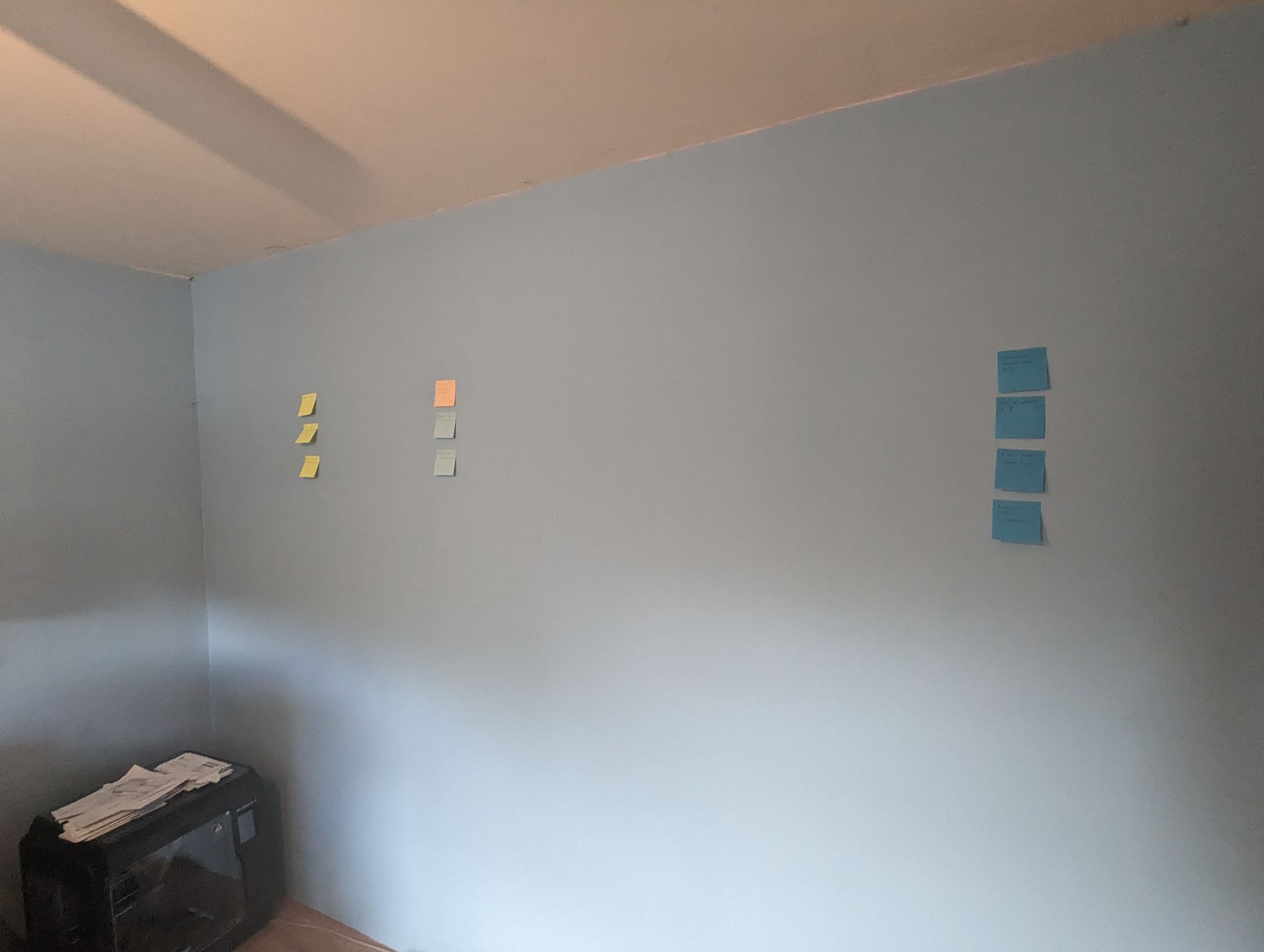
However, what I would do is weekly planning. I would plan the week on Sunday out in an email draft, because I needed some place less distracting to write something down that was cross platform. I would plan monthly themes and weekly themes to set the direction for the month. Did I want to prioritize time with my dog or time for myself? Did I need to focus on my health? Did I want to prioritize networking or job applications? These themes helped me focus then on what tasks I actually wanted to do during the week. I would then say for each task how much effort it would take: No Big Deal, Quarter day, Half Day, Full Day. If the task was simple like "send an email to someone" I could mark it NBD, but sometimes it might feel like a lot! If it was the same task but social anxiety inducing, I might mark it a quarter day of effort because it was a lot to psyche myself up to do it. This forced me to be honest with myself about what I could and couldn't do in a day and also realistically understand that if all I have is one task for the day then it might be a big one and that's okay. It's not that I'm doing less than other days it's that I have one big one. I could say I'm doing enough because I filled up the time with a consciously chosen big task.
Every Monday I'd make post its for the week and then put them on the wall. The day's tasks would be posted on my computer for me to see what I still had to do.
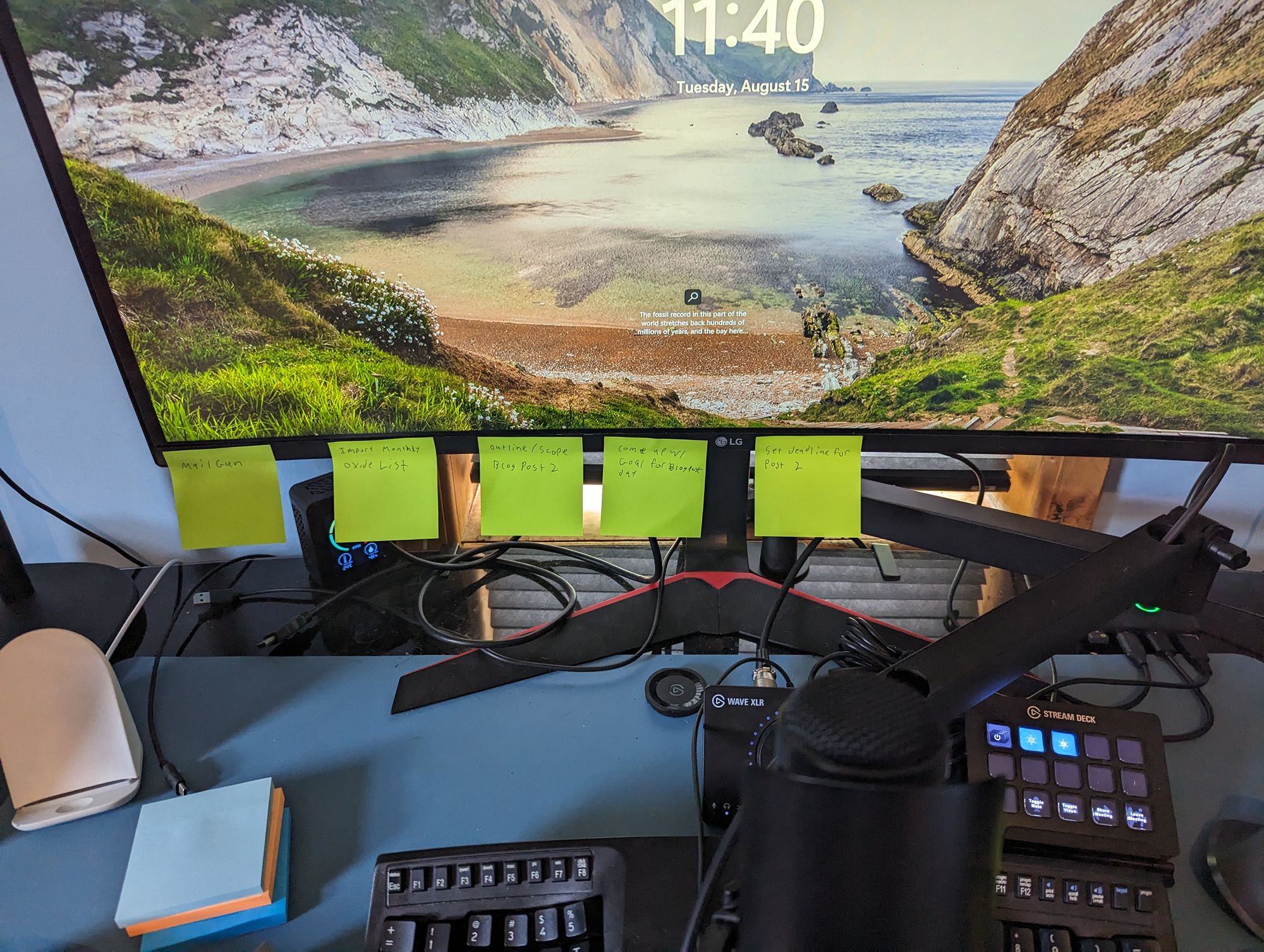
I would then send that day's tasks to my partner so she would know what I was doing for the day and we could keep in sync with each other what was going on. This system took advantage of the fact that I don't like letting people down and that I work better with accountability. The upside is my partner was able to also know what was going on so if she needed some help that day or something then it was clear what my work load was like that day and would also help me know what I needed to do and be able to set boundaries better or advocate for my own needs.
This was great! I hacked a trait I didn't like about myself, being a people pleaser and needing external structure, into something useful and with someone who is caring, loving, and understanding, rather than say a boss who I fear would fire me. It also worked with my poor memory because if I had a new task I needed to keep track of I could put it on a stickie and put it in an unsorted area on the wall. The other plus was that I could see that I was doing a lot more than I thought I ever had and it gave me a more realistic view of what I could do. Plus it looked nice seeing a bunch of done tasks on the wall.
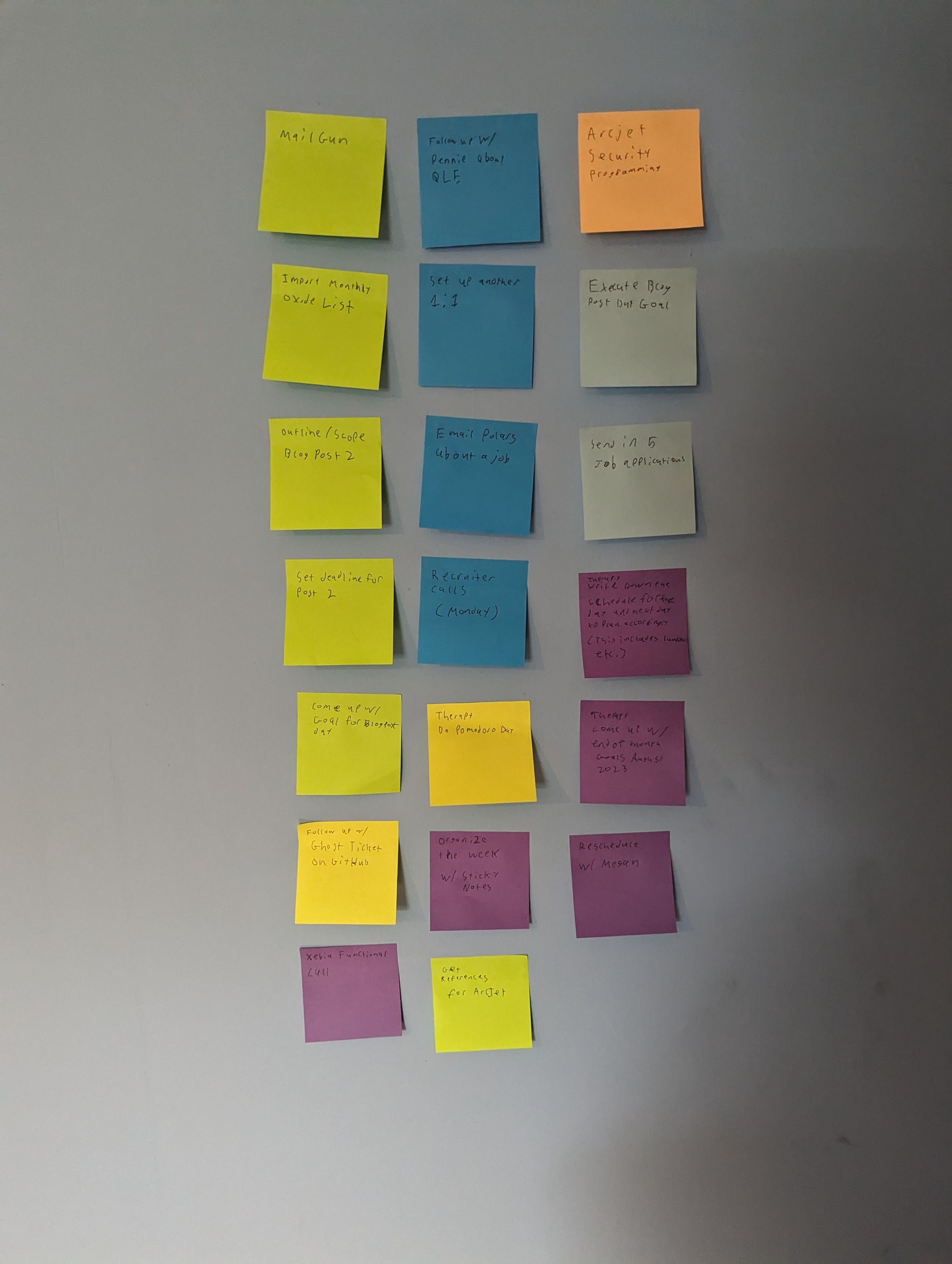
However, this system was not without it's disadvantages
- If I needed to be flexible during the week, I already had written that week's sticky notes and would have to either throw some away or shift them and I didn't always know what I had left in the week if I tried to come up with a plan the day before to account for things like surprise ER Vet Appointments that might have happened.
- It was hard for my partner to read what was on the notes in those pictures and if I took one of the rest of the week's tasks she couldn't really see them
We then had to adapt the system to these new found problems. Just like software we had to add new features as new edge cases were discovered. We didn't throw out the whole system though and do a complete rewrite because it was working it just now needed to be made better.
This led to my partner getting me a daily planner that had a to do list. and calendar all in one and that's where things got even better.
A Daily Planner, what a concept!
So here's an image of my planner so you can get an idea of what I'm working with
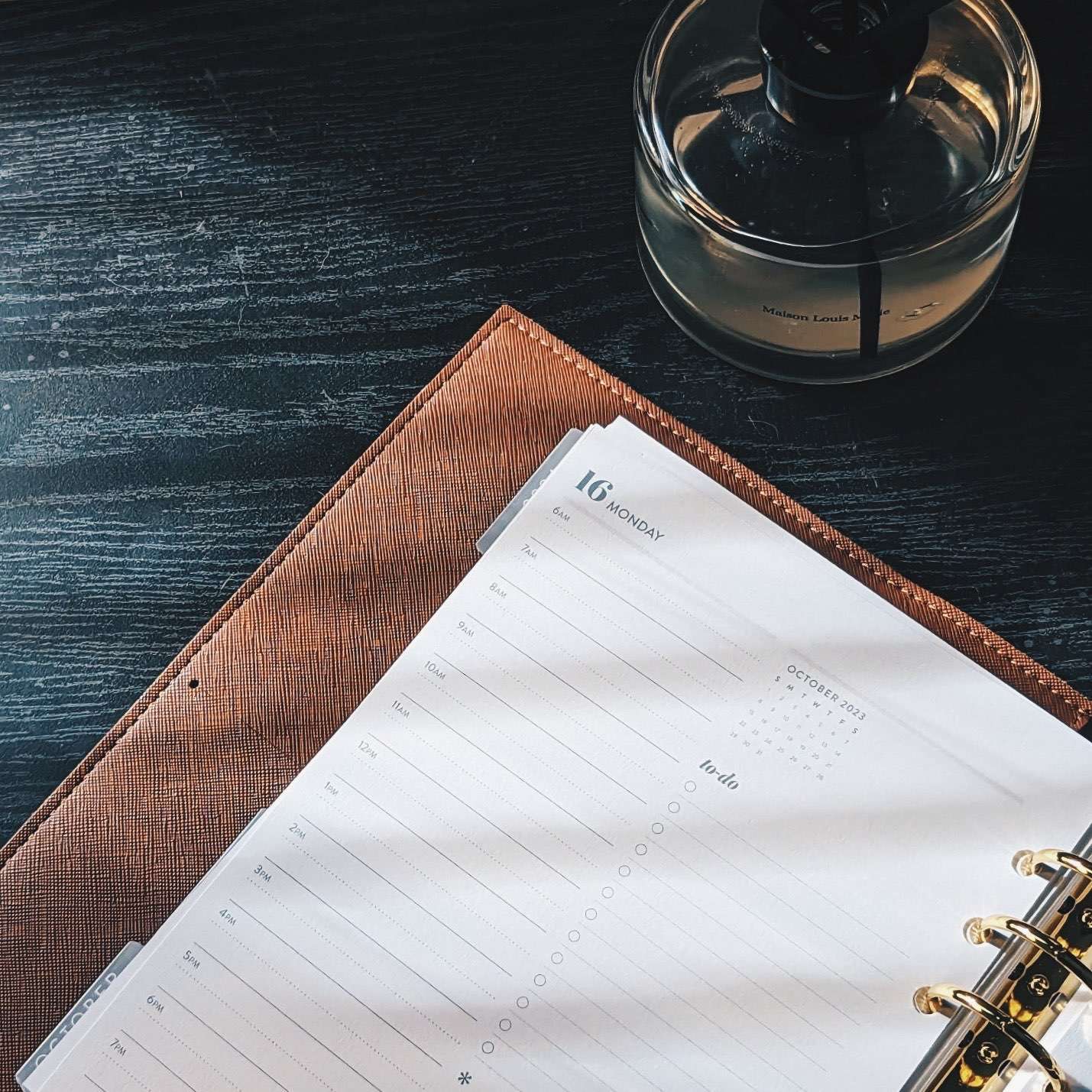
I have on it a to-do list, a little note section, and a per hour schedule on each day. With this instead of writing out the notes on Monday for the week, we would instead write out the next day on the page and "lock it in" every day. This continues the accountability I needed, helps my partner know what to expect for my hourly schedule that day and my work load. It also had the added benefit of letting me be flexible. I could move scheduled weekly tasks around in my draft folder as needed, but then lock it in as each day came around. Normally if it's a good week I don't need to move things around, but it's nice having the flexibility when I do need it.
The system still wasn't perfect yet though, because Sunday planning was also just a bit sub par:
- I was working with a draft email which when working on multiple devices could create a second draft with not everything updated perfectly. I had deleted the wrong draft too many times.
- I was using a tool in a way it wasn't really meant to be used
- I wasn't breaking up tasks enough (e.g. finding people to network with and then contacting them same day was too draining for me)
This wasn't too hard to fix though. I moved to Google Keep to act as a transient destination of data. It was fine for me to use digital here because it was a scratch pad and not my main source to refer too. Since it was only used to lock in the day I wasn't going to get distracted either. Since it also keeps the data in sync and can handle conflicts I wasn't having the issue I was having with the drafts folder. The only downside is it's 50/50 on whether Google will kill it in a year or two like they do with everything they own. I know it'll be on the chopping block once I can start messaging people with it and I will then be adrift looking for a new app that just keeps basic notes, is cross platform, has no bells and whistles, and no data conflicts. Until then I'm okay with this system.
As for breaking up tasks that was just a process change. After weeks of using my new systems I had a better understanding of how I worked more and how certain tasks did or did not work for me and so I could adapt my planning to them. One of which was that sometimes I might have a big task and if it was paralyzing me should break it up into smaller actionable ones. Once I got started on one it made the rest easier to do and helped me keep in mind everything I needed to actually do rather than a nebulous big "Do X thing".
With all of that I'm far more productive than I ever was before, meds or not, and I don't feel like I'm going to burn out like I did before because I have a better grasp of what I'm capable of. In many ways I came to accept myself and know myself better than I did before and this has been the key to being productive, more so than any one tool or methodology. My partner says that I'm more productive than I've ever been before and that the transformation these past few months has been radical. It works and it's a huge relief.
I'm still adding new systems as well! For instance I decided that since paper was working for me I should just go all in. No more cooking blogs for recipes, it's all cook books now (which is now fun and not stressful). I'm actually journaling daily now and I got myself a nice leather bound one to enjoy and this is also helping me out mentally. We're still working on a system for tasks needing to be done around the house (cause it's not that I don't want to help I just again keep forgetting) and it's still got rough edges, but I bought a cheap 2 dollar notebook from RiteAid to keep it down on paper things that need to get done and I choose a few each day to do to help out. I think I'm just a paper kind of guy and that works for me.
To facilitate this all I even got a new bag to carry the iPad around that I use for weekly planning and lock in sessions, all my cooking books I want to peruse and plan my meal nights, my planner, journal, and chores notebook.
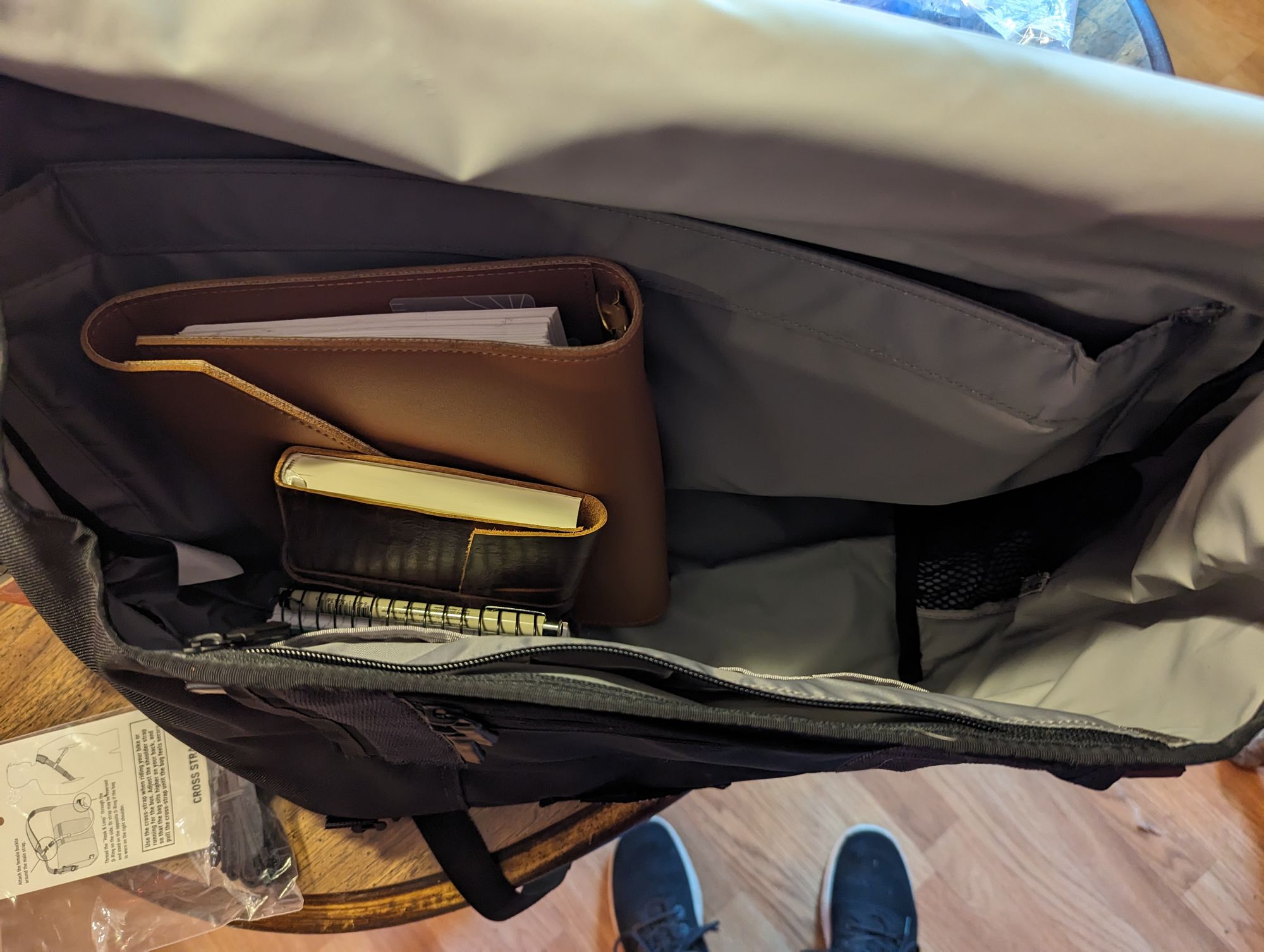
As new needs an problems arise (e.g. I couldn't carry all these items back and forth between her house and mine) I would adapt or add to my existing systems. The key had been starting with something anything and changing it over time, rather than trying to plan a perfect structure from the get go, or do too many changes all at once. Fixing each problem one at a time was the better path to take.
Conclusion
Here are the key take aways for organization that I hope you can adapt to your needs and make a system that works for you:
- Know yourself and use it to your advantage. I had to leave my books in front of the door so I wouldn't forget them. I also talk to my partner daily about what I'll be doing to stay accountable. If it works it works and it's nothing to be ashamed of, you just need to find what does for you and how you tick.
- Adapt over time don't plan it all at once. It might feel better to have the system all built out upfront, but that just doesn't work. You don't know what will and won't work for you and it's better to flexible and adapt then to throw the whole thing out and not have any system for organizing
- It's a marathon not a race. It has taken me 30 years of life to get to this point to try something that works and about 5 months of actually using this system to polish it and get it to where it is today. Patience and time are needed. You'll have to practice at it if you're starting from 0 and that's okay.
- Self compassion is needed as well. You are not a perfect person, you have flaws, strengths and weaknesses and that's okay. Love who you are today, they're the one who will get you to the person you want to be tomorrow.
I hope this was helpful. I hope you can find something that works for you and I want you to know there is hope if you struggle like I have. Best of luck.